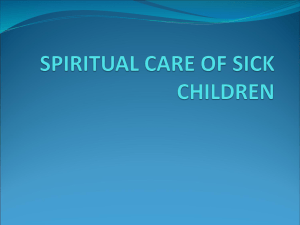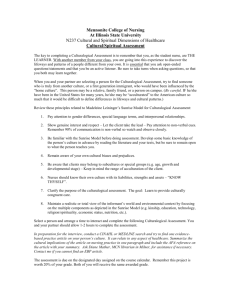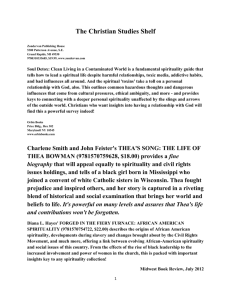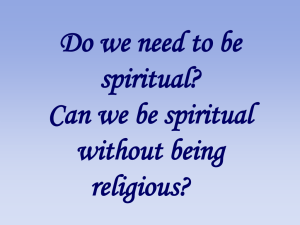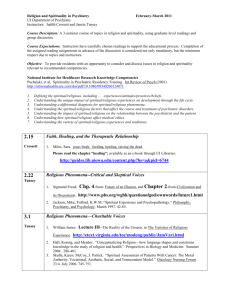Understanding the Role of Spirituality in Medicine
advertisement
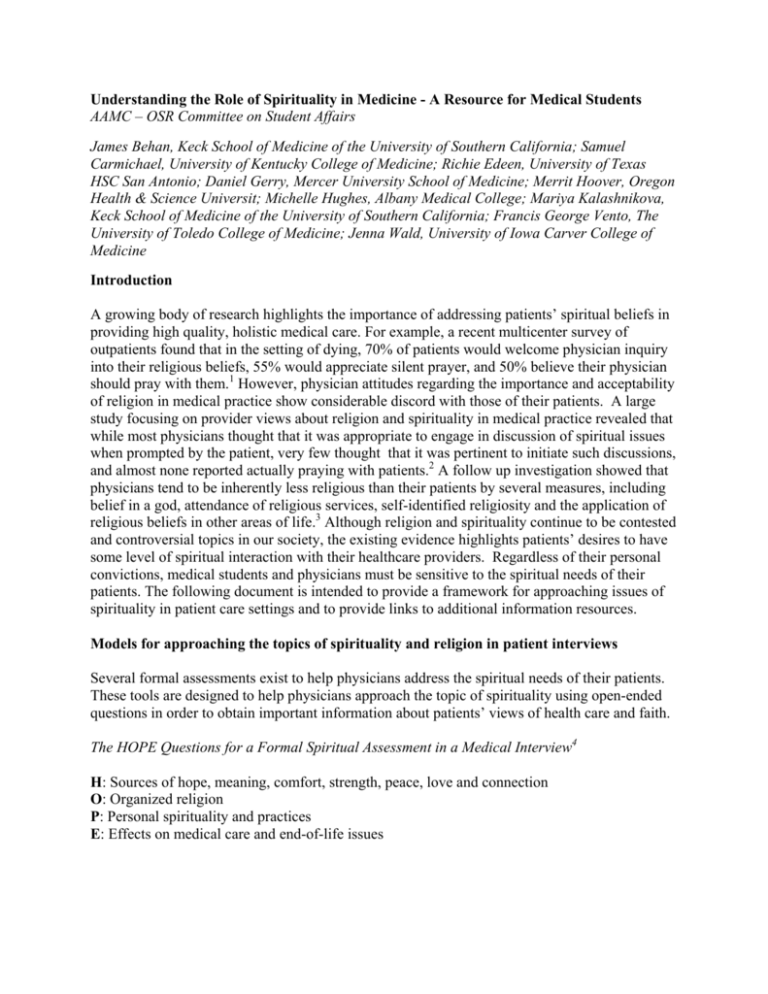
Understanding the Role of Spirituality in Medicine - A Resource for Medical Students AAMC – OSR Committee on Student Affairs James Behan, Keck School of Medicine of the University of Southern California; Samuel Carmichael, University of Kentucky College of Medicine; Richie Edeen, University of Texas HSC San Antonio; Daniel Gerry, Mercer University School of Medicine; Merrit Hoover, Oregon Health & Science Universit; Michelle Hughes, Albany Medical College; Mariya Kalashnikova, Keck School of Medicine of the University of Southern California; Francis George Vento, The University of Toledo College of Medicine; Jenna Wald, University of Iowa Carver College of Medicine Introduction A growing body of research highlights the importance of addressing patients’ spiritual beliefs in providing high quality, holistic medical care. For example, a recent multicenter survey of outpatients found that in the setting of dying, 70% of patients would welcome physician inquiry into their religious beliefs, 55% would appreciate silent prayer, and 50% believe their physician should pray with them.1 However, physician attitudes regarding the importance and acceptability of religion in medical practice show considerable discord with those of their patients. A large study focusing on provider views about religion and spirituality in medical practice revealed that while most physicians thought that it was appropriate to engage in discussion of spiritual issues when prompted by the patient, very few thought that it was pertinent to initiate such discussions, and almost none reported actually praying with patients.2 A follow up investigation showed that physicians tend to be inherently less religious than their patients by several measures, including belief in a god, attendance of religious services, self-identified religiosity and the application of religious beliefs in other areas of life.3 Although religion and spirituality continue to be contested and controversial topics in our society, the existing evidence highlights patients’ desires to have some level of spiritual interaction with their healthcare providers. Regardless of their personal convictions, medical students and physicians must be sensitive to the spiritual needs of their patients. The following document is intended to provide a framework for approaching issues of spirituality in patient care settings and to provide links to additional information resources. Models for approaching the topics of spirituality and religion in patient interviews Several formal assessments exist to help physicians address the spiritual needs of their patients. These tools are designed to help physicians approach the topic of spirituality using open-ended questions in order to obtain important information about patients’ views of health care and faith. The HOPE Questions for a Formal Spiritual Assessment in a Medical Interview4 H: Sources of hope, meaning, comfort, strength, peace, love and connection O: Organized religion P: Personal spirituality and practices E: Effects on medical care and end-of-life issues SPIRIT5 Spiritual Belief System Personal Spirituality Integration and Involvement in a Spiritual Community Ritualized Practices and Restrictions Implications for Medical Care Terminal Events Planning (advance directives) FICA Spiritual History Tool6 F – Faith and Belief Do you consider yourself spiritual or religious?" or "Do you have spiritual beliefs that help you cope with stress?" If the patient responds "No," the health care provider might ask, "What gives your life meaning?" Sometimes patients respond with answers such as family, career, or nature. I – Importance "What importance does your faith or belief have in our life? Have your beliefs influenced how you take care of yourself in this illness? What role do your beliefs play in regaining your health?" C – Community "Are you part of a spiritual or religious community? Is this of support to you and how? Is there a group of people you really love or who are important to you?" Communities such as churches, temples, and mosques, or a group of like-minded friends can serve as strong support systems for some patients. A – Address in Care "How would you like me, your healthcare provider, to address these issues in your healthcare?" *If interested, 2”x4” plastic FICA cards are available on the GWish website (link available in references section). Additional Resources Religious Diversity: Practical Points for Health Care Providers – An excellent and thorough guide to specific beliefs held by different world religions about medical care. Link: http://www.uphs.upenn.edu/pastoral/resed/diversity_points.html. Drexel University College of Medicine: Spirituality and Religion in Medicine - A website dedicated to exploring different topics relating to religion and medicine, including prayer, addictions and medical ethics. Provides extensive links to articles and other web resources. Link: http://webcampus.drexelmed.edu/religion/default.asp. The George Washington Institute for Spirituality and Health – GWish is a leader in the field of religion and medicine, working towards a more compassionate system of healthcare through research, education and policy work focused on bringing increased attention to the spiritual needs of patients, families and healthcare professionals. Link: http://www.gwish.org/. References: 1. MacLean CD, Susi B, Phifer N, et al. Patient preference for physician discussion and practice of spirituality. J Gen Intern Med 2003; 18:38–43. 2. Curlin FA, et. al. The association of physicians’ religious characteristics with their attitudes and self-reported behaviors regarding religion and spirituality in the clinical encounter. Medical Care 2006; 44(5): 446-453. 3. Curlin FA, et. al. Religious characteristics of U.S. physicians: A national survey. J Gen Intern Med 2005; 20: 629-634. 4. Anandarajah G and Hight E. Spirituality and Medical Practice: Using the HOPE Questions as a Practical Tool for Spiritual Assessment. Am Fam Physician 2001; 63(1): 81-89. http://www.aafp.org/afp/2001/0101/p81.html 5. McCormick, T. “Spirituality and Medicine.” Ethics In Medicine. 2010. University of Washington School of Medicine. 17 Jun. 2012 <http://depts.washington.edu/bioethx/topics/spirit.html#ques3>. 6. “FICA Spiritual History Tool.” The George Washington Institute for Spirituality and Health. 17 Jun. 2012. <http://www.gwish.org/>.



